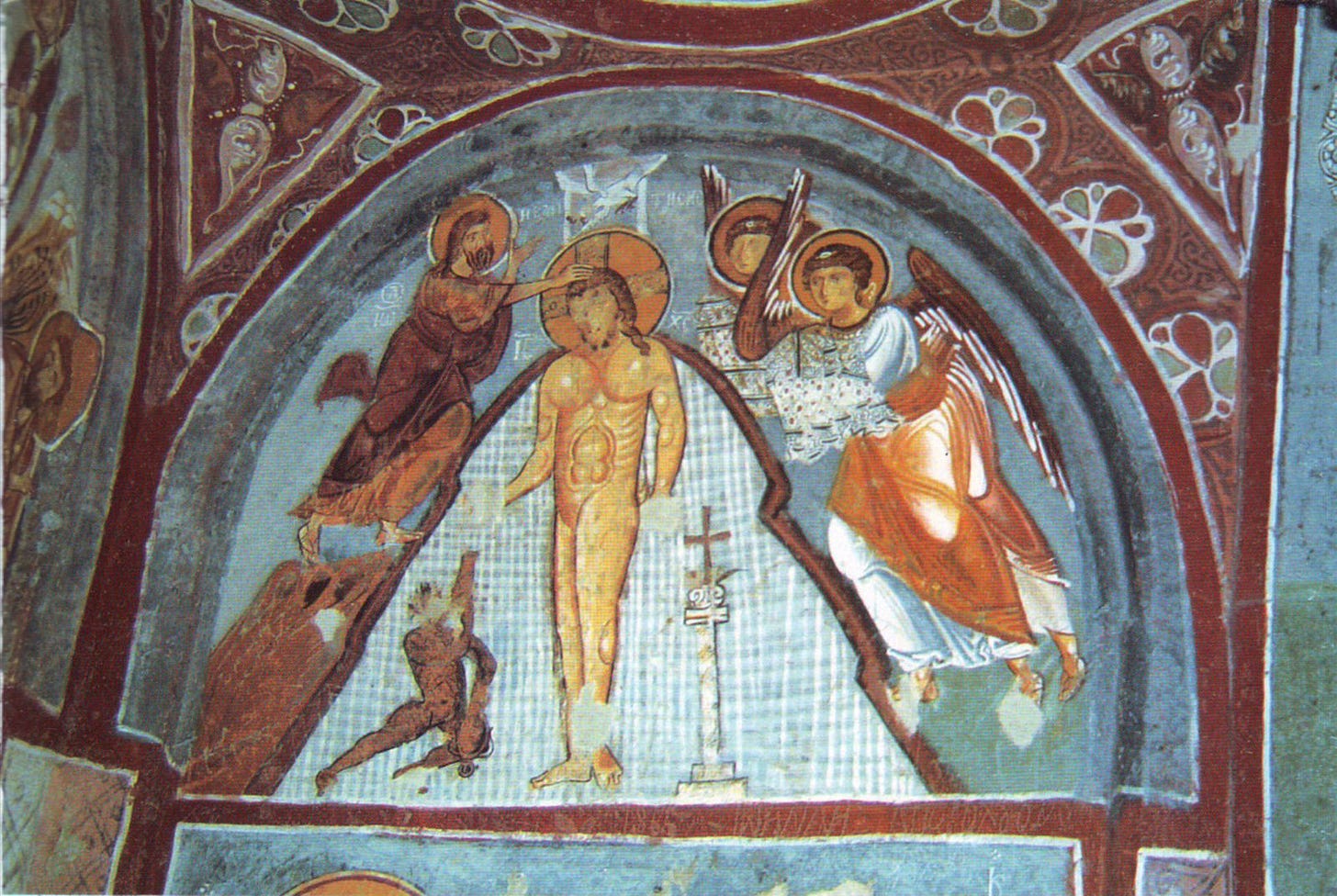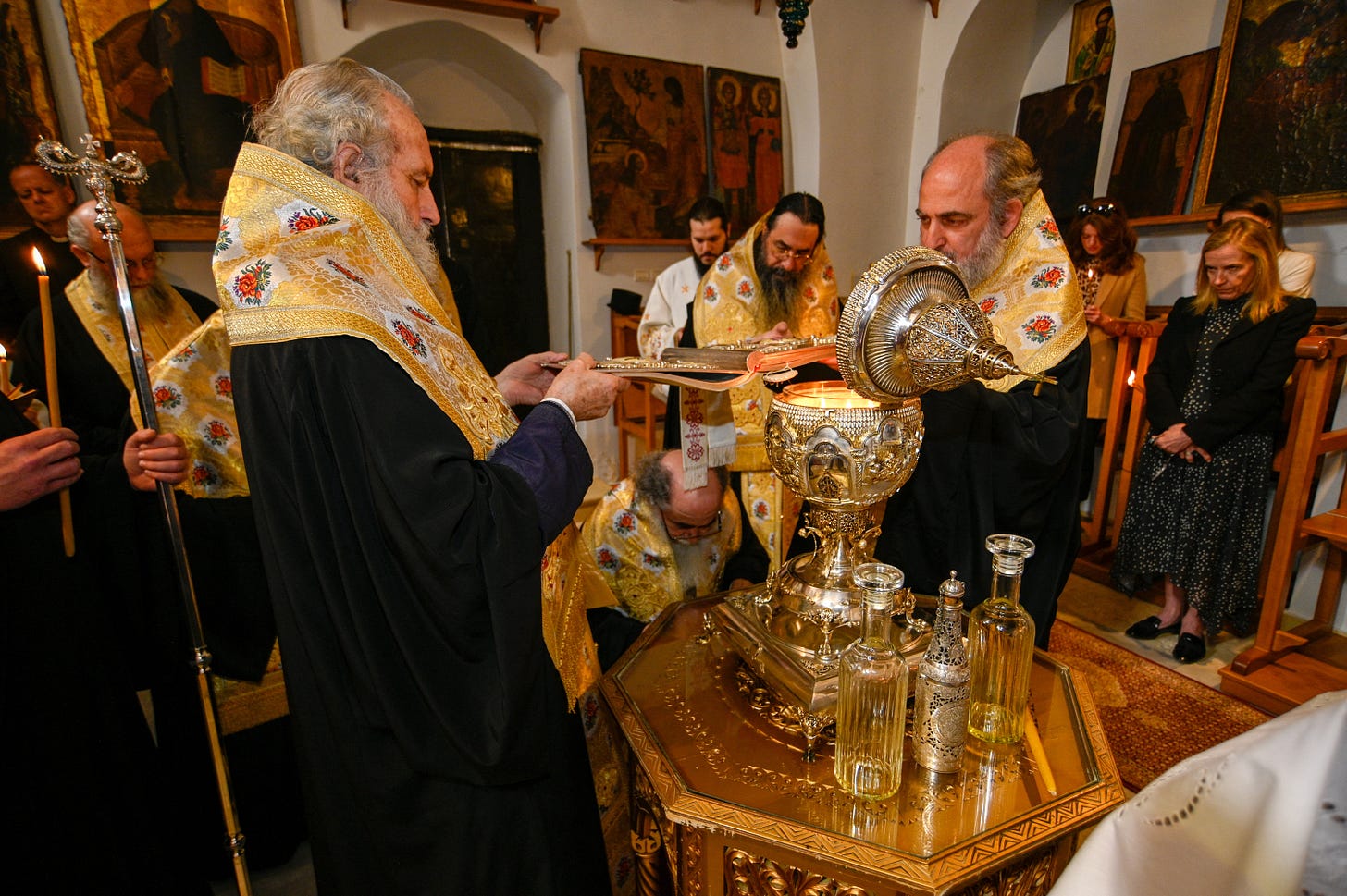In my last written post, I began to explore the mystery of repentance. The word is metanoia in Greek, a word which, I said, means ‘change the nous’. And as a first step in the direction of understanding, Fr. N. helped us to understand what the nous is.
We learned that the nous is a) the faculty within us with which we are properly identified; and b) the faculty which sees everything that we perceive, both visible and invisible, sensible and rational.
I ended the post thus:
However, if metanoia means ‘change the nous’; and if nous is the mental faculty whereby, through intense focus, we perceive what we see; and furthermore, if nous is the part of the soul with which we are most properly identified, then we’re getting closer to an idea of what true repentance might mean.
So yes, the Greek for repentance is metanoia. To take our understanding of repentance one step further, let’s tackle some lexicological analysis.
Metanoia is a verbal noun. (A verbal noun is a noun derived from a verb. ‘Cat’ is not a verbal noun. ‘Cat-sitting’ is a verbal noun.) The verb from which metanoia is derived is metanoeō (μετανοέω, pronounced meta-no-EH-oh). This is the verb which Christ uses, in the plural imperative, when he says: ‘Repent! (Μετανοεῖτε!) For the kingdom of heaven is near!’
As you can see, metanoeō is translated into English by the verb ‘to repent’. But take care. Its meaning in Greek is less emotional in tenor, less guilt ridden, and more intellectual—literally, more noetic—than ‘repent’ is in English. At the very least, in Greek repentance is not limited simply to an emotional, penitential experience. To see how, let’s drill down deeper into metanoeō.
The verb metanoeō, ‘to repent’, is a compound of the preposition meta and the verb noeō (pronounced no-EH-oh). Because the last shall be first, we’ll start with noeō.
You often see noeō defined as ‘to think’. And yes, noeō can include thinking along with every other kind of mental activity. But thinking implies words or thoughts in the head. This isn’t the best fit for noeō. In fact, noeō is the verb of which nous is the verbal noun, and so, just as we’ve seen with nous, the real meaning of noeō tends to incline less toward thinking, more toward seeing. Indeed, etymologically the basic sense of noeō is ‘to perceive’. And so nous, its verbal noun, which we’ve translated as ‘mind’ and others sometimes translate as ‘intellect’, literally means something like ‘perceiving’.
This tracks with what Fr. N. taught us about nous. Nous is not your thinking. It is your seeing your thinking. And so, when St Basil and the other Fathers say that essentially you are a nous, they are saying that essentially you are pure perceiving. Take that in. What you are is pure perceiving. The content of that perception—including thoughts, imaginings, sense data, memories, dreams, wishes, and experiences—is extraneous. Which isn’t to say those things are meaningless or without value. But they are not you.
As for the first half of the verb metanoeō, meta is a preposition that at root means ‘with’ and more commonly has the derived meaning ‘after’. However, like most prepositions its semantic range is rather wide, and when used as a prefix, as it is in the verb metanoeō, it carries the additional nuanced sense of ‘change’.
You can now see that, on one level of interpretation, meta plus noeō is ‘after’ plus ‘to think’ and therefore metanoeō can mean ‘afterthought’, ‘rethink’, ‘thinking again’, and ‘regret’.
While on another level of interpretation, meta plus noeō is ‘change’ plus ‘to perceive’ and so metanoeō can mean something like ‘changing perception’, ‘perceiving in a different way’, or ‘evolved seeing’.
Two levels of interpretation. I believe these indicate two levels, or degrees, of repentance, and that these two levels can be linked, respectively, to St John the Baptist and Jesus Christ.

Recall that St John’s ministry, which preceded Christ’s by several months if not years, was based on the same command: ‘Repent! For the kingdom of heaven is near!’ His is the first voice in the Gospels to cry ‘Repent!’. Both his ministry and Christ’s include that same proclamation.
And yet, the Gospels draw a distinction between the two. St John’s is framed as preparatory; his is ‘the voice crying in the wilderness: Prepare the way of the Lord! Make his paths straight!’ By contrast, Christ’s ministry is framed as fulfilment; his is the Way itself, for which St John’s preaching prepares the soul.
The preparatory repentance that St John exhorts his hearers to undertake is linked with both ‘the forgiveness of sins’ and being ‘baptised with water’. This is the first repentance, which corresponds to that first way of interpreting metanoeō, repentance as regretful afterthought. In fact, I’d like to suggest that, when it issues from the mouth of St John the Baptist, metanoeō exclusively carries this conventional sense. It is also the way in which the word overlaps most comfortably with how repentance is usually understood in English. Having lived a life of sin, you think again. Pondering your sins regretfully, you decide to change your ways.
Now, this conventional way of understanding repentance is perfectly sound. Indeed it is indispensable. It is the moment when the soul, like the Prodigal Son in the parable, ‘comes to itself’, admits its folly, and turns back to the Father—which is to say, when the soul resolves no longer to follow the desires of its own heart but rather to follow the commandments of God. This is absolutely necessary for progress along the spiritual way.
As experienced at this primary level, repentance is often very watery indeed. Not only does it correspond to the element of water in the sacrament of baptism, and therefore to the catechumenate, when candidates for baptism by immersion in water are initiated into the teachings of the Church and prepare themselves for their first confession; but also, when undertaken properly, this mode of repentance can provoke such intense feelings of regret, shame, and even horror—the horror of coming face to face with the reality of your sin and its consequences for you and for others—that you break down in tears. And I mean floods of tears; hot, aching tears; uncontrollable, even frenzied weeping. This is the first repentance.
The second repentance is something else. It is associated more particularly with that ‘way of the Lord’ for which the first repentance prepares the soul by ‘making his paths straight’. St John himself says that whereas he baptises with water, the one whose ministry would follow his would baptise with the Holy Spirit. And what I’m suggesting is that this baptism, Christ’s baptism, the baptism of the Holy Spirit, is a second repentance; which is to say, an advanced stage of metanoia, the stage which corresponds to that deeper, more primary level of interpretation of metanoeō: ‘changing perception’, ‘perceiving in a different way’, ‘evolved seeing’.
And if the first repentance aligns with the element of water in the sacrament of baptism, then the second repentance aligns with the element of oil, both in that same sacrament and in the sacrament which (in the Orthodox Church) follows directly after baptism, the sacrament of chrismation.
Both rituals feature holy oil throughout. Holy oil is poured into the baptismal water at the outset of the ritual; the baptizand is anointed with holy oil before stepping into the baptismal font; and after emerging from the font triply immersed, he or she is again anointed with holy oil. As Christ is literally the Anointed One (christos means ‘anointed’ in Greek, which is mashiach in Hebrew, ‘Messiah’), this dual ritual, baptism and chrismation, employing both elements, water and oil, is literally ‘the baptism of Christ’. The Church also calls this combined sacrament ‘illumination’, a word that fits nicely into metanoia in its deeper sense of ‘changing the way you see’.
There’s a further dimension to this second repentance. Anointing is pre-eminently associated with kingship. The kings of Ancient Israel were made kings by anointing with oil. To this day, in the few places where the tradition of Christian kingship remains intact, kingship is conferred by anointing with holy oil.

So here we see a link between true metanoia and kingship. And what was that initial Gospel proclamation? ‘Repent! For the kingdom of heaven is near!’ There’s the same link, made explicit from the very beginning.
Thus the mystery of repentance deepens. Focused noetic seeing overlaps with the coming of the Kingdom.
When, back in episode 1, Leo the Great began his Sermon 19 by invoking the coming of the Kingdom, he connected that mystical event to focused noetic seeing by quoting this saying of our Lord: ‘Watch yourselves! Lest your hearts be weighed down with dissipation and drunkenness and cares of this life.’ Then in episodes 3 and 4, Basil the Great explained in great detail what ‘watch yourselves’ means; or in his own words, what it means to ‘be attentive to yourself’. He characterised that self-attentiveness as ‘maintaining purity in the governing part of the soul’, i.e. in the nous, and said that this purity—the purity of heart which Abba Moses in episode 5 calls the proximate goal on which we should focus all our efforts—‘creates calm for the Logos through silence’.
Purity of heart creating calm for the Logos through silence. What does that entail? What might it mean for the spiritual life?
We will continue to explore these questions and more as Life Sentences proceeds.





Great stuff. I find it fascinating how much the Fathers seem to be articulating (what we would now call) a theory of mind as much as anything else. Taking the science of the soul, ie psychology, back to its roots.
On these two senses of repentance, is it accurate to say that the second sense includes training yourself to “take every thought captive”, ie perceiving temptation but not succumbing? Given an “evolved perception” could include the ability to see the paths before you, and decide which one to take.
As for the meaning of purity of heart, what springs to mind is the quote that I have just discovered is Kierkegaard - “purity of heart is to will one thing”. Something I have pondered a lot over the years. Looking forward to hearing how it relates with Orthodox thought.